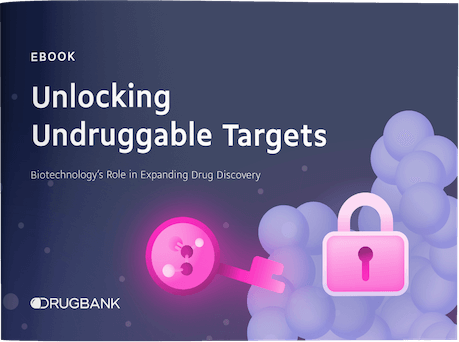Explore a selection of our essential drug information below, or:
Identification
- Generic Name
- SC12267
- DrugBank Accession Number
- DB05125
- Background
SC12267 is a novel, small molecule agent from the class of DMARDs (disease modifying anti-rheumatic drug) for the therapy of autoimmune diseases such as rheumatoid arthritis or multiple sclerosis. Through highly selective inhibition of pyrimidine biosynthesis, it controls the growth of rapidly proliferating cells, especially of lymphocytes, which are important for the immune response.
- Type
- Small Molecule
- Groups
- Investigational
- Synonyms
- Not Available
Pharmacology
- Indication
Investigated for use/treatment in multiple sclerosis and rheumatoid arthritis.
 Reduce drug development failure ratesBuild, train, & validate machine-learning modelswith evidence-based and structured datasets.Build, train, & validate predictive machine-learning models with structured datasets.
Reduce drug development failure ratesBuild, train, & validate machine-learning modelswith evidence-based and structured datasets.Build, train, & validate predictive machine-learning models with structured datasets.- Contraindications & Blackbox Warnings
 Prevent Adverse Drug Events TodayTap into our Clinical API for life-saving information on contraindications & blackbox warnings, population restrictions, harmful risks, & more.Avoid life-threatening adverse drug events with our Clinical API
Prevent Adverse Drug Events TodayTap into our Clinical API for life-saving information on contraindications & blackbox warnings, population restrictions, harmful risks, & more.Avoid life-threatening adverse drug events with our Clinical API- Pharmacodynamics
Not Available
- Mechanism of action
SC12267, a novel, selective and orally available, small molecule inhibitor of dihydroorotate dehydrogenase (DHODH), interferes with cell proliferation through blocking the synthesis pathway of pyrimidines. Its mode-of- action is of therapeutic relevance for the treatment of autoimmune disorders such as rheumatoid arthritis and multiple sclerosis.
Target Actions Organism UDihydroorotate dehydrogenase (quinone), mitochondrial Not Available Humans - Absorption
Not Available
- Volume of distribution
Not Available
- Protein binding
Not Available
- Metabolism
- Not Available
- Route of elimination
Not Available
- Half-life
Not Available
- Clearance
Not Available
- Adverse Effects
 Improve decision support & research outcomesWith structured adverse effects data, including: blackbox warnings, adverse reactions, warning & precautions, & incidence rates. View sample adverse effects data in our new Data Library!Improve decision support & research outcomes with our structured adverse effects data.
Improve decision support & research outcomesWith structured adverse effects data, including: blackbox warnings, adverse reactions, warning & precautions, & incidence rates. View sample adverse effects data in our new Data Library!Improve decision support & research outcomes with our structured adverse effects data.- Toxicity
Not Available
- Pathways
- Not Available
- Pharmacogenomic Effects/ADRs
- Not Available
Interactions
- Drug Interactions
- This information should not be interpreted without the help of a healthcare provider. If you believe you are experiencing an interaction, contact a healthcare provider immediately. The absence of an interaction does not necessarily mean no interactions exist.Not Available
- Food Interactions
- Not Available
Categories
- Drug Categories
- Not Available
- Classification
- Not classified
- Affected organisms
- Not Available
Chemical Identifiers
- UNII
- Not Available
- CAS number
- Not Available
- InChI Key
- Not Available
- InChI
- Not Available
- IUPAC Name
- Not Available
- SMILES
- Not Available
References
- General References
- Not Available
- External Links
- PubChem Substance
- 347909962
Clinical Trials
- Clinical Trials
Clinical Trial & Rare Diseases Add-on Data Package
Explore 4,000+ rare diseases, orphan drugs & condition pairs, clinical trial why stopped data, & more. Preview package Phase Status Purpose Conditions Count Start Date Why Stopped 100+ additional columns Unlock 175K+ rows when you subscribe.View sample data2 Completed Treatment Inflammatory Bowel Diseases (IBD) 1 somestatus stop reason just information to hide 2 Completed Treatment Rheumatoid Arthritis 1 somestatus stop reason just information to hide
Pharmacoeconomics
- Manufacturers
- Not Available
- Packagers
- Not Available
- Dosage Forms
- Not Available
- Prices
- Not Available
- Patents
- Not Available
Properties
- State
- Solid
- Experimental Properties
- Not Available
- Predicted Properties
- Not Available
- Predicted ADMET Features
- Not Available
Spectra
- Mass Spec (NIST)
- Not Available
- Spectra
- Not Available
- Chromatographic Properties
Collision Cross Sections (CCS)
Not Available
Targets

- Kind
- Protein
- Organism
- Humans
- Pharmacological action
- Unknown
- General Function
- Catalyzes the conversion of dihydroorotate to orotate with quinone as electron acceptor. Required for UMP biosynthesis via de novo pathway
- Specific Function
- dihydroorotase activity
- Gene Name
- DHODH
- Uniprot ID
- Q02127
- Uniprot Name
- Dihydroorotate dehydrogenase (quinone), mitochondrial
- Molecular Weight
- 42866.93 Da
Drug created at October 21, 2007 22:23 / Updated at June 12, 2020 16:52


